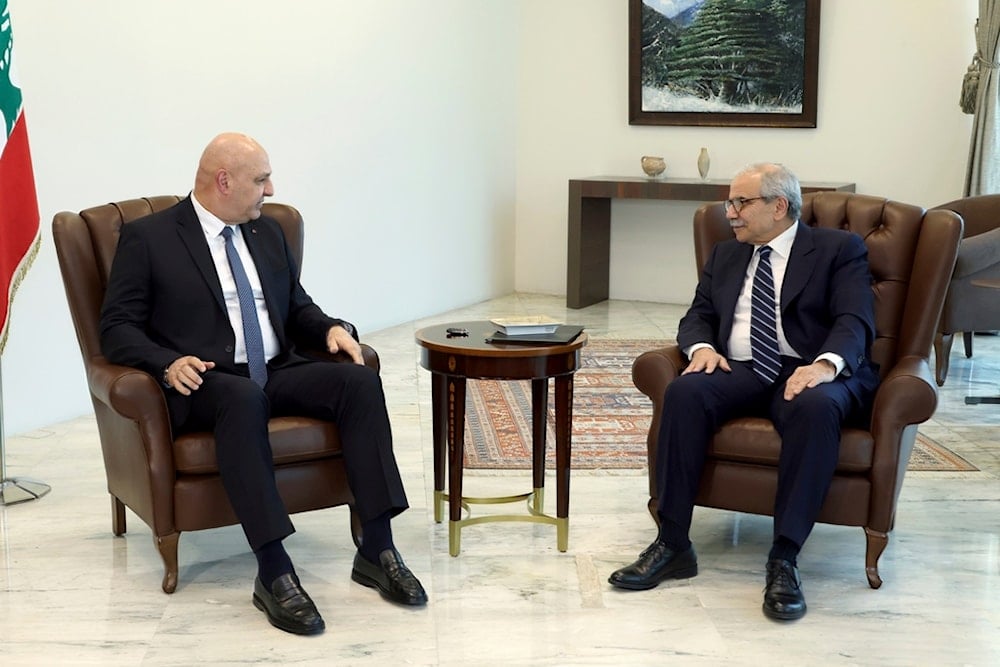Lebanese cabinet approves US plan to disarm Resistance amid tension
Lebanon’s cabinet approved what it described as "US envoy’s proposal goals", while Hezbollah and Amal ministers protested the approach to the implementation of the disarmament.
-

Lebanese president Joseph Aoun, left, and Lebanese Prime Minister Nawaf Salam, right, meet ahead of a Cabinet meeting at the presidential palace in Baabda, east of Beirut, Lebanon, Tuesday, August 5, 2025. (Lebanese Presidency press office)
The Lebanese government has formally approved the overarching objectives outlined in the preamble of the US envoy Tom Barrack’s proposal, Information Minister Paul Morcos announced Thursday following a cabinet session.
Morcos clarified that while the cabinet has agreed to the general goals of the American paper, it has not yet addressed the operational details and conditions attached to it. “The Council of Ministers has not entered into discussions over the annexes and specific elements of the US paper,” he said, adding that deliberations on those points will begin once the Lebanese Army presents its implementation plan.
Shiite ministers voice process objections
Addressing the contentious withdrawal of ministers from the Hezbollah-Amal alliance during the previous session, Morcos said their objection was not to the principle of exclusive state control over arms, a position enshrined in the ministerial statement, but rather to the approach being pursued. “They did not raise the issue of mīthāqiyya (consensual legitimacy),” he emphasized, distancing the walkout from broader constitutional disputes.
Lebanese Agriculture Minister Abbas Hani also commented on the session during an interview with Al Mayadeen, stressing that the cabinet's agenda items are “synchronized” and that “there is no ranking” among them. He added that “guarantees have been provided by Lebanon’s friends, including the United States.”
Hani further downplayed the political weight of the Shiite bloc's withdrawal, asserting that “the session retained its constitutional legitimacy” and explaining that the ministers left before the vote on the American paper’s general goals.
US envoy praises step amid domestic criticism
US envoy Tom Barrack celebrated the outcome on social media, calling it a "historic, bold, and correct decision" by Lebanon’s president and prime minister. “This week’s Cabinet resolutions finally put into motion the 'One Nation, One Army' solution for Lebanon. We stand behind the Lebanese people,” Barrack wrote on X.
Congratulations to Lebanese President Aoun @lbpresidency, Prime Minister @nawafsalam, and the Council of Ministers for making the historic, bold, and correct decision this week to begin fully implementing the November 2024 Cessation of Hostilities agreement, UN Security Council…
— Ambassador Tom Barrack (@USAMBTurkiye) August 7, 2025
The move has drawn mixed reactions from domestic political and religious figures. Sheikh Ali al-Khatib, Deputy Head of Lebanon’s Higher Islamic Shiite Council, called on President Joseph Aoun to convene a national dialogue session to reach a consensus-based solution and avoid deepening the crisis. He warned that Barrack had “succeeded in shifting the confrontation from a Lebanese-Israeli issue to a political confrontation within the government.”
Meanwhile, the Beirut Ulema Council issued a stark warning, stating that “decisions like these may lead the country into the unknown.”
Shiite ministers walk out of session
Ministers representing the national Shia alliance, Hezbollah and the Amal Movement, alongside Minister of State for Administrative Development Fadi Makki, withdrew from the Lebanese cabinet session on Thursday afternoon, according to Al Mayadeen’s correspondent in Beirut.
According to Al Mayadeen, the ministers explicitly refused to engage with the American proposal and insisted on a broader reassessment of the cabinet’s course of action.
The reporter noted that the withdrawal of ministers representing Lebanon’s Shia component now throws the cabinet’s constitutional legitimacy into question. The Lebanese constitution, particularly in its preamble, emphasizes that cabinet sessions must maintain national representation. The absence of any sectarian component strips the government of its "mīthāqiyya", rendering any decision taken in such a session effectively void in the eyes of many political factions.
'US proposal aids Israeli agenda'
The Loyalty to the Resistance Bloc warned Thursday that Lebanon and the wider region are undergoing one of the most dangerous phases in recent history, facing existential threats to their sovereignty, geography, and economy. In a statement following its regular meeting, the bloc denounced the escalating Israeli aggression, backed by the United States and certain Western and Arab powers, as part of a broader campaign aimed at redrawing regional balances at Lebanon's expense.
At the heart of the bloc's condemnation is the Lebanese government's recent endorsement of a proposal put forward by US envoy Tom Barrack. The bloc described the move as "a clear reversal" of the government's ministerial commitments and a breach of the presidential oath. It stressed that the paper contradicts the foundational principles of the Taif Accord, which guarantees Lebanon's right to self-defense and the preservation of national sovereignty.
The bloc described the government's endorsement of the US paper as "suspiciously hasty and unjustifiable," warning that such a position constitutes a "clear violation of the National Pact" and threatens to strip Lebanon of one of its greatest sources of strength: the Resistance.

 5 Min Read
5 Min Read








